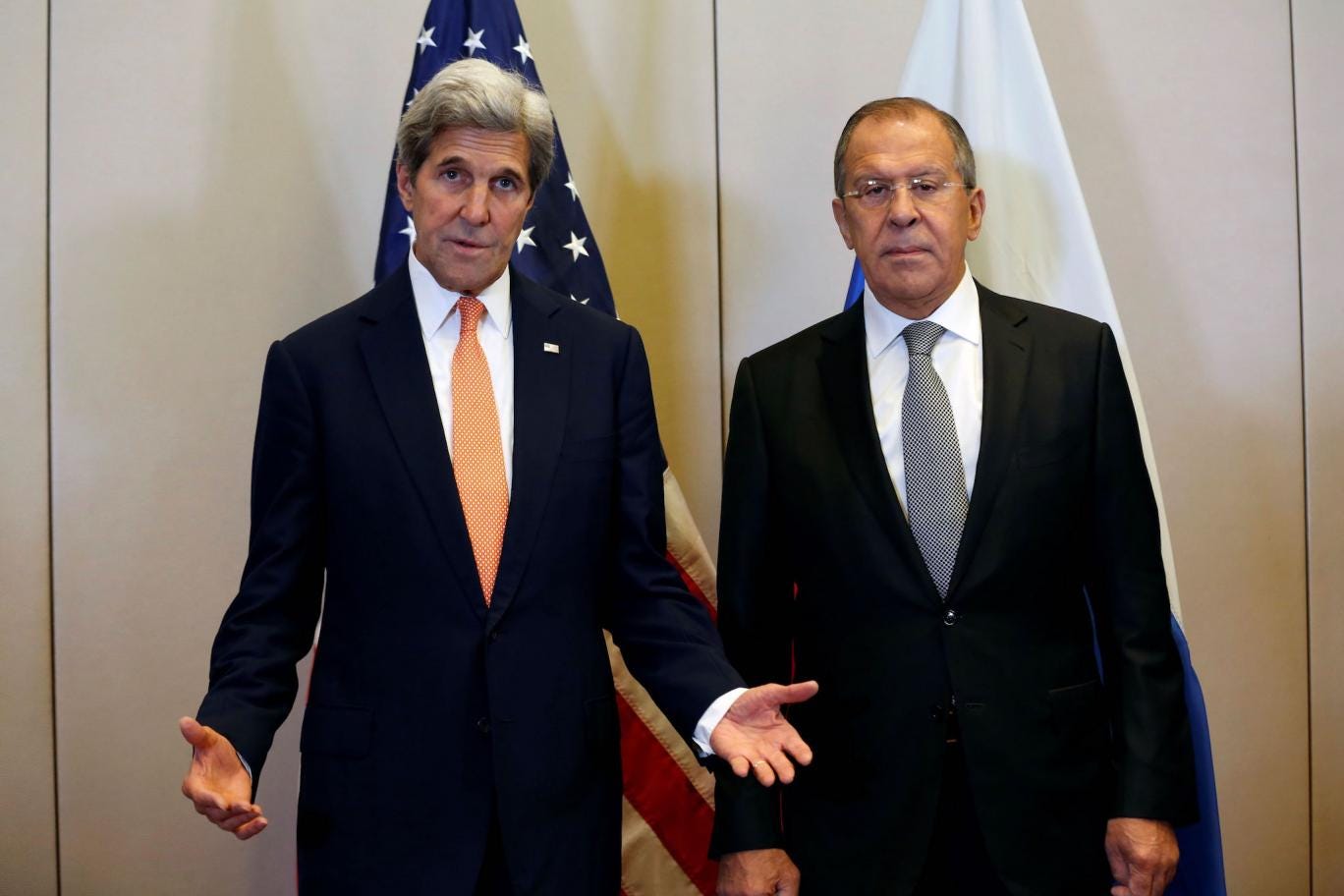
Mr. Kerry, speaking to reporters after on-and-off talks with his Russian counterpart that began Friday morning and stretched past midnight, said the deal reached by the
U.S. and Russia aims to reduce violence and eventually move toward a political transition. But signs of a divide within the administration over the wisdom of the deal began to emerge, with skepticism at the Pentagon over whether to trust the Russians and enter any military partnership with them on the battlefield.
Beginning at sundown on Monday in Syria, Russia and the U.S. would use their influence on the parties they support in the conflict, including the regime and opposition groups, to try to bring about seven consecutive days of relative calm at the significantly lower levels of violence that took place in February under a cease-fire that was backed by the United Nations Security Council but has since unraveled.
The arrangement is set to go into effect with a cessation of hostilities from sunset next Monday, September 12th, between the Syrian government forces of President Bashar al-Assad, who is supported by Russia, and US-backed opposition rebels. The
deal requires both the rebels and the regime in Damascus “to meet their obligations,” Mr Kerry said.
Despite simmering tensions between Washington and Moscow, the US and Russian militaries will then work together to target Islamic State forces and the al-Nusra Front, the al-Qaeda affiliate that is operating in Syria. Mr Kerry insisted the terror groups would have to be pursued “not indiscriminately, but in a systematic way.”
The agreement calls for Assad to ground his air force over opposition areas and halt combat missions against specified rebel forces. Following a period of calm and attempts to gather intelligence on the two terror groups, the US and Russia then plan to launch joint air strikes against Isis and the al-Nusra Front.
Friday’s negotiations at a hotel in Geneva had stretched long into the night. Mr Kerry announced the agreement shortly after Saturday at a joint press conference with Russia’s foreign minister Sergey Lavrov, who confirmed the deal and emphasized that Assad’s government was prepared to comply with its terms.
“This is not the end of the journey, this is the very start of our new relations,” Mr Lavrov said. “We hope that all those who sincerely value peace, who cherish a Syrian, multinational, multi-confessional state, will support our agreement."
The marathon meeting was the fourth such encounter between US and Russian diplomats in the past fortnight, as the world strained to see whether there might at last be a formula for ending the five-year civil war in Syria, which has already claimed 500,000 lives and triggered the largest refugee crisis since the Second World War.
Defense Secretary Ash Carter and Director of National Intelligence James Clapper have recently publicly voiced concerns about the diplomacy. In China, Mr. Obama said he was unsure the U.S. could reach a deal by which Moscow would abide. The U.S. has in the past entered into agreements with Russia over Syria and Ukraine, only to have them unravel.
“Those commitments must be fully met before any potential military cooperation can occur. We will be watching closely the implementation of this understanding in the days ahead.”
The arrangement brokered by Mr. Kerry, if implemented, could achieve a sustained cessation of hostilities, help ease the suffering of the Syrian people and address the immediate humanitarian catastrophe in Aleppo.
Mr. Carter was among those in the Obama administration who questioned the agreement and Russia’s willingness to see through the terms of the deal. Mr. Carter in the past has accused Russia of being dishonest about its goals in Syria by claiming to go after terrorism while primarily working to regain territory for Mr. Assad and shore up the strength of his regime.
Defense Secretary Ash Carter and Director of National Intelligence James Clapper have recently publicly voiced concerns about the diplomacy. In China, Mr. Obama said he was unsure the U.S. could reach a deal by which Moscow would abide. The U.S. has in the past entered into agreements with Russia over Syria and Ukraine, only to have them unravel. Meanwhile, Pentagon press secretary Peter Cook said the preliminary understanding requires Russia and the Syrian government to carry out specific steps, including the cessation of hostilities for at least seven days, before any tie-up with the U.S. armed forces is possible. “Those commitments must be fully met before any potential military cooperation can occur,” Mr. Cook said. “We will be watching closely the implementation of this understanding in the days ahead.” Mr. Cook said the arrangement brokered by Mr. Kerry, if implemented, could “achieve a sustained cessation of hostilities, help ease the suffering of the Syrian people and address the immediate humanitarian catastrophe in Aleppo.” It wasn’t immediately clear whether the preliminary agreement Mr. Kerry brokered had won the wholehearted backing of the Obama administration after the round of quick-fire negotiations on Friday. A U.S. official said Mr. Carter was among those in the Obama administration who questioned the agreement and Russia’s willingness to see through the terms of the deal. Mr. Carter in the past has accused Russia of being dishonest about its goals in Syria by claiming to go after terrorism while primarily working to regain territory for Mr. Assad and shore up the strength of his regime.
Four days ago ... Chlorine attack on Aleppo by the Assad regime. Do more guys. Don't let this happen again.
No comments:
Post a Comment
Through this ever open gate
None come too early
None too late
Thanks for dropping in ... the PICs